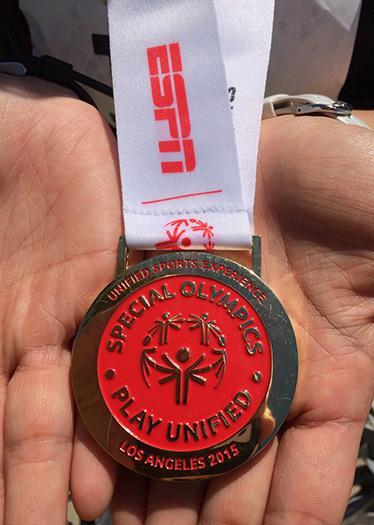Let me win. But if I cannot win, let me be brave in the attempt.
– Special Olympics athlete oath
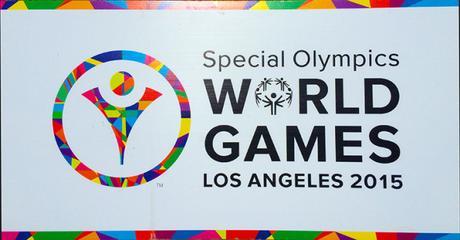
There’s a lot to love about Los Angeles: its weather, its beaches, its diversity…
We’re lucky to live in the most diverse city in the country. And nowhere has that diversity – and yes, that weather and those beaches – been on fuller display than at the Special Olympics World Games held here July 25 – August 2.
Billboards announcing the World Games appeared all over SoCal months in advance. It would be the world’s largest sporting event of 2015, and the largest hosted by L.A. since the 1984 Summer Olympics, where American Joan Benoit captured the gold in the first-ever Olympic women’s marathon. So the World Games promised a unique opportunity for the city to showcase and embrace its trademark diversity.
Founded in 1968 by Eunice Kennedy Shriver and inspired by her sister Rosemary, Special Olympics is the world’s largest sports organization for children and adults with intellectual disabilities. Today the organization supports 4.5 million athletes in 170 countries. At the 2015 World Games 6,500 of those athletes from 165 nations would be competing in 25 Olympic-style sporting events at venues ranging from UCLA to USC to Long Beach.
Special Olympics was founded on the principle that every individual deserves the opportunity to realize their full potential. This emphasis on empowerment and human dignity is what’s always attracted me to the organization, and so with its flagship event happening in our backyard, nothing short of a tsunami or medical emergency was going to prevent us from signing on as volunteers to help promote Ms. Shriver’s vision.
Thanks to the organizers at Spectrum Sports, Katie and I were assigned to – what else? – the triathlon and half marathon. The two events were held on consecutive weekends in Alamitos Beach in Long Beach, less than a mile from my brother’s place. Weather-wise, both days played out in predictable Long Beach fashion, with early morning clouds burning off quickly so that by 8:30am, clear skies prevailed as temperatures climbed into the 80s.
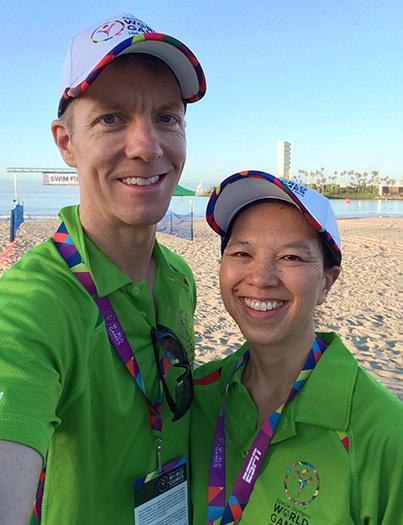
Volunteering for selfie duty before the triathlon start
The triathlon and half marathon events each got underway with the World Games competitors (~20 per event), followed 15-20 minutes later by the Unified division which featured a mix of athletes with and without intellectual disabilities competing together. I’d briefly considered running the Unified half marathon before opting instead for volunteer status – bottom line, this week should be all about the Special Olympics athletes, and my front-row seat as a volunteer would allow me to be part of the action while cheering on the athletes. Which sounded like a win-win to me.
Katie and I were stationed at different points along each course, and though I can’t speak for her, my own volunteer (or as Special Olympics calls them, “Hero”) responsibilities were pretty straightforward. To prepare for the triathlon start I chatted with other volunteers, raked debris away from the start line and helped clear a path for the athletes to and from the shore.
Watching the triathletes prepare for the start, I quickly realized that competition at the World Games would not be taken lightly – this wasn’t suburban America, where competition is de-emphasized, games are played without scores and every kid gets a trophy just for showing up. The athletes here took their responsibility to themselves and their countries seriously, and I was struck by their intensity of focus, which never wavered even in the face of mounting heat and obvious physical discomfort.
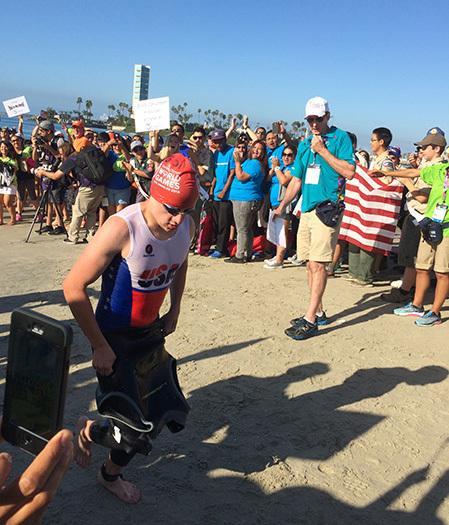
Overall winner Noah Dellas sheds his wetsuit en route to the first transition
Eventual overall winner Noah Dellas of New Jersey was the first to complete the 750-meter (0.47-mile) swim and reach the transition point, followed by his U.S. teammates and a steady stream of pursuers from Costa Rica, Uruguay and other nations. Once all Special Olympics and Unified athletes had completed the swim, I legged it across the beach to the aid station where Katie was already dishing out water and encouragement to triathletes in the final leg of the competition, the 5K run.
One highlight of the Games was seeing Dellas’ teammate Ben Heitmeyer approach our aid station heralded by his red, white & blue USA singlet. Ben’s purposeful stride signaled a man on a mission, and in that moment I was reminded of Robert Patrick’s T-1000 character from “Terminator 2” – I even wondered whether freezing Ben in liquid nitrogen and shattering him into a million tiny shards would do much more than momentarily delay his progress.
Watching the singular focus on Heitmeyer’s face on his way to capturing a gold medal in his division, it struck me that “intellectual disability” in no way equates to “weak mind”. In fact, add to the physical discomfort we all feel during races the physiological unease of an athlete living with Down Syndrome or fragile X syndrome, and you could argue that despite their disabilities, their minds are in fact stronger than what rests between your ears or mine. How many of you have trained for and completed a triathlon? I know I haven’t.
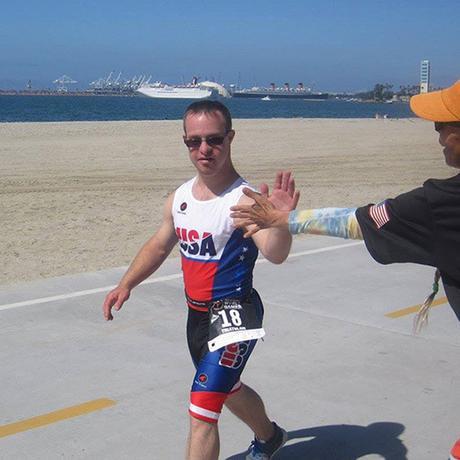
American Ben Heitmeyer shares a high-five on his way to gold (photo Chuck)
Of course what made the World Games shine, what elevated them above any other sporting event I’ve attended, were athletes like Noah and Ben. Their personal stories wove a complex tapestry of emotions you’d be hard-pressed to find anywhere else, stories such as:
- Olivia Quigley of Wisconsin, who nearly sat out her 100-meter sprint final due to chemotherapy-induced exhaustion. Diagnosed with Stage 4 breast cancer, the 24-year-old chose to postpone her ongoing chemotherapy in order to travel to California and compete in the World Games. Summoning all her remaining energy at the start line, she not only competed in the final but flew down the homestretch to win a gold medal, a victory which she later admitted she “really, really wanted.” Quigley would also earn a silver medal in the next day’s 200-meter sprint final, before flying home to await surgery and at least a year of follow-up radiation treatment.
- Mary Davis of Virginia, who at age 72 entered the Games as our nation’s oldest delegate, and who helped lead Team USA to gold in the Bocce team competition. Davis also took home a bronze medal in the Bocce singles competition.
- Patrick Yerman of Montana, who in an interview told ESPN, “I have low hearing loss, autism, and ADHD. I do have vision trouble – my vision’s like 20:200, so I’m technically legally blind.” After a pause he added matter-of-factly, “That’s about all.” As a World Games athlete, Yerman overcame all of his disabilities to win a bronze medal in the Cycling 10-km Road Race.
One emotion not woven into the tapesty of these athletes’ lives is pity. For those who have only a fleeting familiarity with Special Olympics, your initial response may understandably be one of pity. But it should end there, and Eunice Kennedy Shriver herself would have been quick to agree. Self-pity isn’t an option for these athletes, nor do they want ours.
So rather than focusing on what those with intellectual disabilities can’t do, take the time to discover all they can. Preconceptions are just that, and you can learn a lot about a person by just watching and listening.
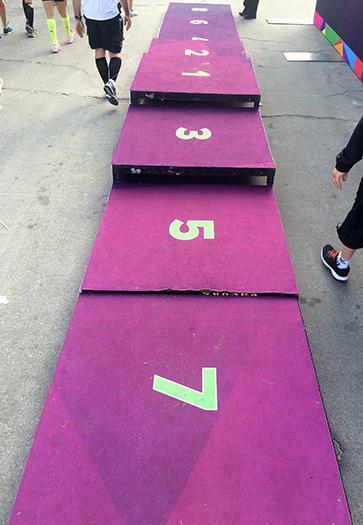
8-level podium used for the World Games medal ceremony
And on the topic of ESPN, though I’ve previously taken them to task on this blog for their laughable coverage of the sport of running, I have to applaud them for their first-rate coverage of the Special Olympics World Games. The nightly manufactured drama of SportsCenter (Did Tom Brady order the Code Red on those footballs? Our experts weigh in!) paled in comparison to the unscripted human drama of the network’s World Games coverage.
The next weekend our volunteer duties turned to the half marathon event. Katie caught a ride to the aid station at miles 9 & 11, while I found myself stationed near the finish line at mile 13. There my only real responsibility lay in directing recreational cyclists and pedestrians off the beachside path that doubled as the course. On the bright side, I was awarded with all-you-can-absorb sunshine and a front row seat for the action.
Here, a disclaimer: I appreciate that in Special Olympics competition the last finisher is every bit as significant as the first – and it was that raucous cheering-on of every single finisher, in part, that made the World Games such a phenomenal event. But as a runner myself, watching Onesmus Mutinda of Kenya dominate the half marathon event on a very warm morning, and watching him approach the mile 13 marker with both index fingers raised to signal his victory – now that was awesome.
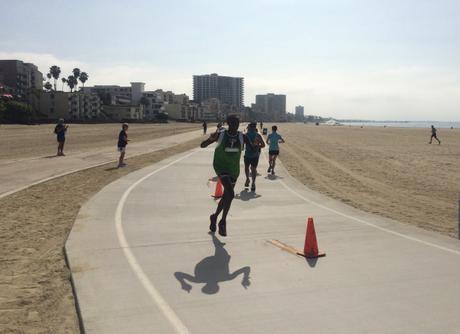
He’s #1: Onesmus Mutinda strides down the home stretch of the half marathon to capture the gold
Between volunteer duties we paid a visit to Cromwell Stadium at USC, site of the track & field events. Spectators and international delegations crowded under the awning that shaded the upper few rows of the metal bleachers. Under the relentless SoCal sun, we cheered on the finalists in the 200-meter sprint and mini-javelin competitions, and exchanged high-fives with the father of American sprinter Brittany Conatser, whose cheering section exploded as she crossed the finish line to win gold.
From there we hustled across the street to the Galen Center to watch the U.S. take on Spain in women’s basketball. Despite the all-inclusive nature of the Games, we’re still sports fans, and admittedly we may have rooted just a bit louder for the American squad. Unfortunately our patriotism wasn’t enough as the Spanish team eked out a victory behind their sparkplug of a point guard, who scored 22 of the team’s 24 points.
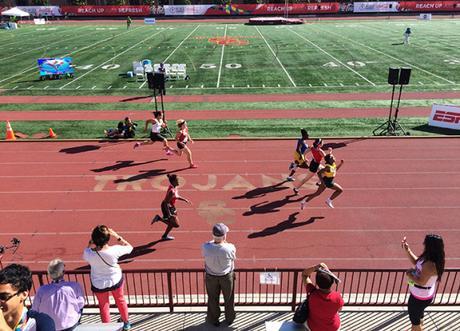
Down the stretch they come! during the 200-meter sprint finals at USC
Our week of World Games activities concluded with the Closing Ceremony at USC’s Memorial Coliseum. Although lacking the pomp and circumstance of its Opening Day counterpart (e.g. no Michelle Obama or Stevie Wonder), the ceremony was a fittingly diverse end to a memorable week. I’ll likely never have another chance to take a group photo for the Mongolian delegation, or high-five a gold medalist from the Isle of Man, or watch in amusement as Olympic athletes break out in a conga line to a live performance by Carly Rae Jepsen. Hats off to USC for hosting the Opening and Closing Ceremonies, and that’s pretty much the last time you’ll hear me praise the University of Spoiled Children on this blog.
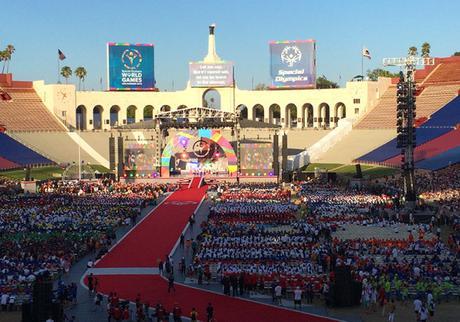
The sun sets on Memorial Coliseum and the 2015 World Games
Our week spent getting to know the athletes of the Special Olympics World Games felt like a legitimate staycation, as though we’d taken a vacation without ever leaving home. And the next time I hear a sportscaster genuflect before a professional athlete/multi-millionaire for their “grace under pressure”, I’ll think of Olivia Quigley, and Mary Davis, and Ben Heitmeyer, and Onesmus Mutinda, and all the other athletes whose humbling grace and poise I witnessed up close and personal over the course of nine postcard-perfect days in my hometown.
No less an authority than Nelson Mandela once said, “A nation should not be judged by how it treats its highest citizens, but its lowest ones.” Not surprisingly, many nations have yet to embrace this philosophy, and as World Games volunteers we were instructed to refer to the athletes and their delegations as “representing the Special Olympics Program – NOT the country.” Individuals with intellectual disabilities still have a long way to go in their global fight for equality – but with the U.S. leading the way, every small step taken in L.A. felt like one giant leap for mankind.
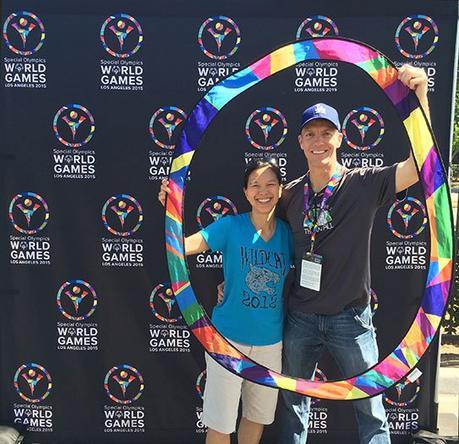
Ironically, in the past five months I’ve witnessed both the best and (arguably) the worst of American sportsmanship right in my own backyard. On the one hand I cringed to see our nation’s fastest-ever marathoner tear off his bib in frustration and slam it to the ground like a spoiled child, after dropping out of the L.A. Marathon injury-free at the halfway point. This, three years after dropping out of the Olympic marathon in London with the letters “USA” emblazoned across his chest.
On the other hand, as a volunteer and spectator at the World Games, I watched as every athlete fought tooth and nail to reach the finish line at all costs. Some crossed the line with arms proudly raised in triumph, whereas others collapsed from exhaustion as if only the promise of the finish line had been holding them upright. And one half marathoner from Puerto Rico never broke stride through 13.1 miles, despite a physical disability that caused his left hand to bend inward and his left foot to point outward.
Despite – in many ways, that was the word of the week here in Los Angeles. Despite being overlooked by the genetic lottery, despite in many places being dismissed as “retards” and shunned as outcasts, despite having to strive every day to achieve what the rest of us routinely take for granted, and despite living in a world that by and large still views “different” with suspicion and fear – despite all of this, the athletes of the 2015 Special Olympics World Games collectively won a lot of medals, captured a lot of hearts and changed a lot of minds. And they did it the only way they know how – by being themselves.
How’s that for grace under pressure? #ReachUpLA
Special Olympics may have 501(c)(3) tax-exempt status, but the organization is far more than a charity; it’s a celebration of our common humanity. Its athletes aren’t faceless charity cases – they’re Olivia, and Brittany, and Patrick, and Noah, and so many other individuals born with intellectual disabilities who want exactly what the rest of us want – a legitimate shot to chase a dream, pursue a passion and succeed in the life they’ve been gifted.
To learn more about Special Olympics and to support your local Special Olympics Program, visit http://www.specialolympics.org.
